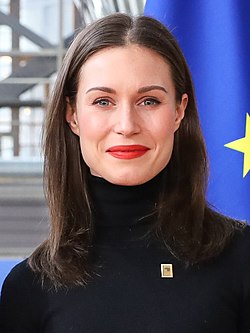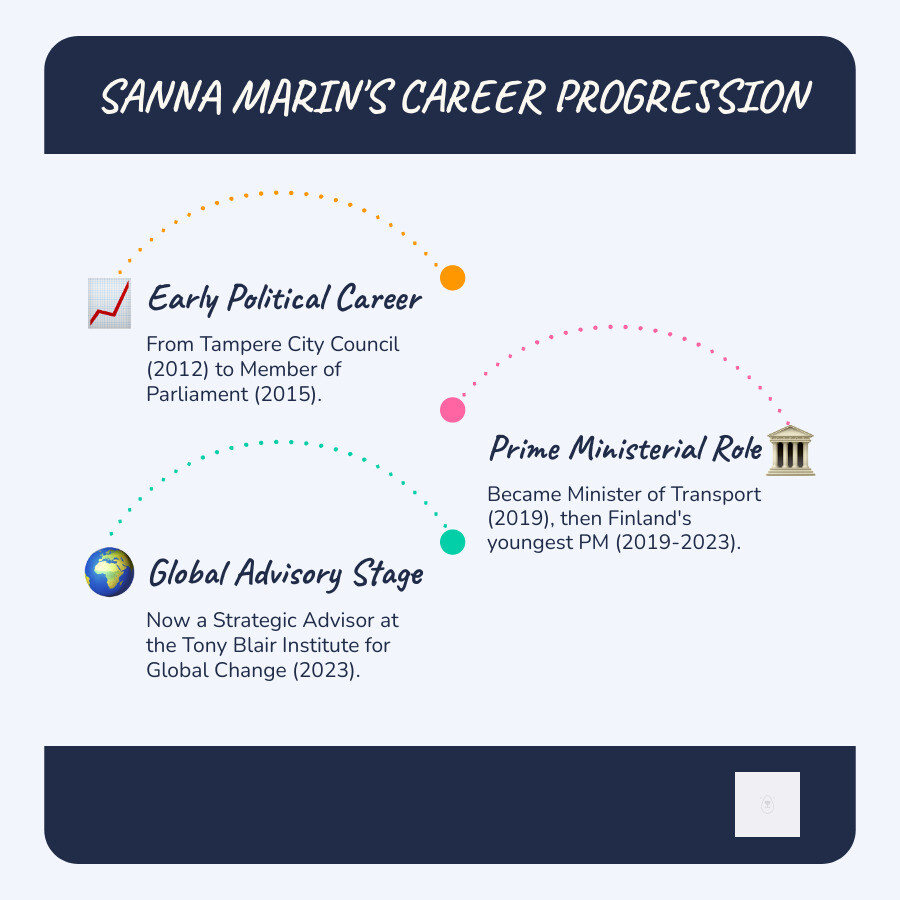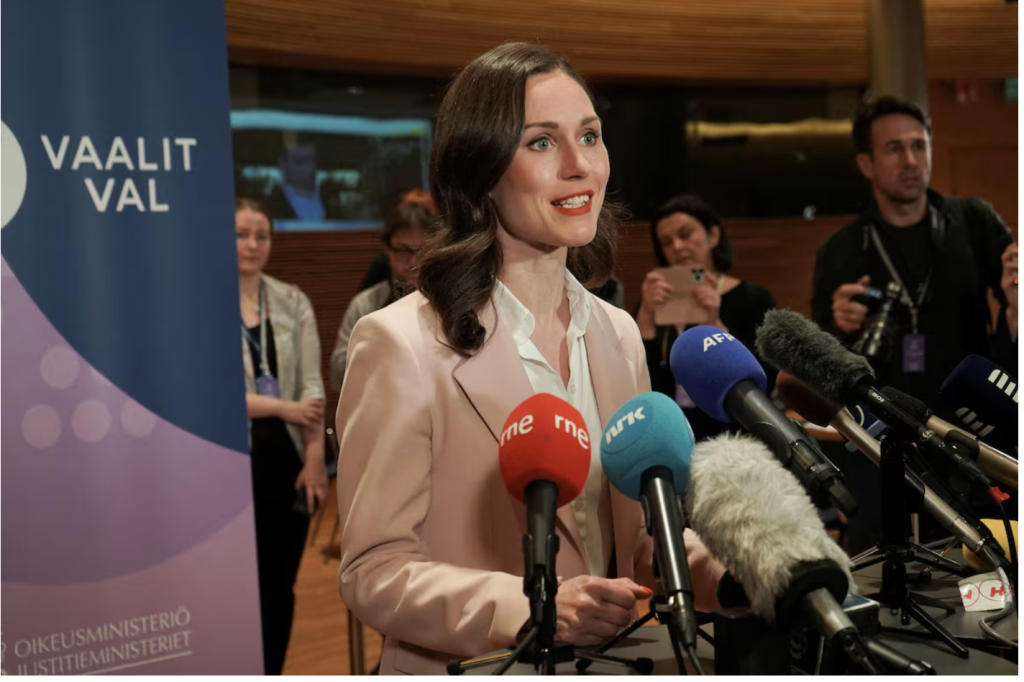
Who is Sanna Marin?

Sanna Marin made history when she became Finland’s youngest Prime Minister at age 34 in 2019, simultaneously earning the distinction as the world’s youngest female head of government. This Finnish politician transformed from a small-town council member to an internationally recognized leader who guided her nation through unprecedented challenges.
Key Facts About Sanna Marin:
- Born: November 16, 1985 in Helsinki, Finland
- Prime Minister: December 2019 – June 2023
- Party: Social Democratic Party (SDP)
- Historic Role: World’s youngest female head of government
- Current Position: Strategic advisor at Tony Blair Institute for Global Change
- Notable Achievement: Led Finland’s successful NATO membership application
Marin’s rise to power represents a generational shift in politics. Raised by her mother and her mother’s female partner in what she calls a “rainbow family,” she was the first in her family to attend university. Her political journey began in local Tampere politics before rapidly ascending to national leadership.
Her premiership was defined by crisis management – from the COVID-19 pandemic to Russia’s invasion of Ukraine, which prompted Finland’s historic decision to join NATO. Yet Marin also became known for controversies surrounding her personal life, including leaked party videos that sparked global debates about sexism and leadership expectations.
Personal Life Highlights:
- Married Markus Räikkönen in 2020 (divorced in 2023)
- Has one daughter
- Known for her modern, relatable leadership style
- Faced intense scrutiny over her social activities
As someone who has covered New York City’s elite social and political circles for over four decades, we’ve witnessed how modern leaders like Sanna Marin redefine public expectations of political figures on the global stage. Her influence extends far beyond Finland, making regular appearances at high-profile events and continuing to shape international discourse on leadership and gender equality.

Basic sanna marin terms:
The Rise of a Millennial Leader
Sanna Marin‘s story reads like a modern fairy tale – but one grounded in grit, determination, and Finland’s progressive values. Born in Helsinki in 1985, she grew up in the small town of Pirkkala, just outside Tampere. Her childhood wasn’t typical by any measure.
Raised by her mother and her mother’s female partner in what she warmly calls a “rainbow family,” Marin experienced what it meant to be different in 1990s Finland. This wasn’t just about family structure – it was about understanding that love comes in many forms, and that everyone deserves equal respect and opportunity.
Money was tight. Sanna Marin worked as a cashier and in a bakery to pay her way through school. She became the first person in her family to attend university – a milestone that speaks volumes about her drive. At the University of Tampere, she earned her Master’s degree in Administrative Sciences, laying the groundwork for her future in public service.
These early experiences shaped everything that followed. Growing up in a non-traditional family while working to support her education gave her a deep understanding of struggle and inequality. It’s the kind of authentic background that resonates with people – something we see often in New York City’s diverse political landscape.

From Local Politics to National Stage
Sanna Marin‘s political journey started small but moved fast. She joined the Social Democratic Youth in 2006, then the main party in 2007. Like many ambitious young politicians, she cut her teeth in local politics first.
Her first run for Tampere City Council in 2008 was unsuccessful – a humbling experience that many rising stars face. But she bounced back, winning a seat in 2012 and quickly making waves. By 2013, she was chairing the council, and her no-nonsense style during heated meetings even went viral on YouTube.
The leap to national politics came in 2015 when she won a seat as a Member of Parliament. Her colleagues clearly saw her potential – by 2017, she was the Social Democrats’ first deputy leader. Then came the big break: Minister of Transport and Communications in 2019.
When the government collapsed later that year, Sanna Marin emerged as the party’s choice for Prime Minister. In less than a decade, she’d gone from local council member to leading a nation of 5.5 million people. It’s the kind of rapid political ascent that would make even New York’s most ambitious politicians take notice.
Finland’s Legacy of Gender Equality
Sanna Marin didn’t rise in a vacuum. Finland has been a pioneer in women’s rights since 1906, when it became the first country to grant women full political rights – both to vote and run for office. That’s more than a century of progressive leadership.
When Marin took office, something remarkable happened. Her coalition government featured five party leaders who were all women – an unprecedented achievement on the global stage. Her cabinet had 12 women out of 19 ministers, and Finland’s parliament boasted an impressive 45.5% female representation.
This wasn’t tokenism or political theater. It was the natural result of decades of commitment to gender equality. Finland had created an environment where talented women like Sanna Marin could rise based on merit, not despite their gender.
The contrast with many other nations is striking. While countries around the world still struggle with glass ceilings, Finland was quietly proving that female-led coalition governments aren’t just possible – they’re effective. It’s a lesson that resonates in places like New York City, where diverse leadership continues to shape progressive politics and social change.
Prime Minister Sanna Marin: A Premiership Defined by Crisis
When Sanna Marin stepped into the Prime Minister’s office in December 2019, she couldn’t have imagined the extraordinary challenges that awaited her. Her four-year tenure would be marked by back-to-back global crises that would test her leadership and reshape Finland’s place in the world.
The first major test came swiftly with the COVID-19 pandemic. As the world grappled with this unprecedented health crisis, Sanna Marin didn’t hesitate to take bold action. Her government declared a state of emergency, implemented strict border controls, and introduced comprehensive measures including school closures and social distancing guidelines. The approach was aggressive, but it worked brilliantly.
Finland’s response stood out among European nations, achieving lower infection rates and a faster economic recovery than many of its neighbors. An opinion poll during this period revealed an impressive 85% approval rating for her pandemic management – the kind of numbers that political leaders can only dream of, even in sophisticated political environments like New York City.
But the defining moment of her premiership came in February 2022, when Russia launched its full-scale invasion of Ukraine. This brutal act of aggression didn’t just threaten Ukraine – it shattered decades of European security assumptions and created what many called an existential crisis for the entire continent. For Finland, sharing an 830-mile border with Russia, the implications were particularly profound.

Finland’s Historic NATO Application
The war in Ukraine became the catalyst for Finland’s most dramatic foreign policy shift in generations. For decades, Finland had carefully maintained military non-alignment, walking a diplomatic tightrope between East and West. This policy of neutrality had served the country well during the Cold War, but Russia’s blatant disregard for international law changed everything.
Sanna Marin found herself at the center of a historic decision. Working closely with President Sauli Niinistö, she helped guide Finland toward applying for NATO membership – a move that would have been unthinkable just months earlier. The shift represented a complete reimagining of Finland’s security strategy.
The diplomatic challenges were immense. Every existing NATO member had to approve Finland’s application, and some countries initially hesitated. But through skilled diplomacy and persistence, Sanna Marin‘s government successfully steerd these complex negotiations.
Finland formally submitted its NATO application in May 2022. After months of diplomatic work, including securing final approvals from Hungary and Turkey, Finland officially became NATO’s 31st member in April 2023. This achievement didn’t just strengthen Finland’s security – it fundamentally altered the strategic balance in Northern Europe, a geopolitical shift discussed in diplomatic circles from Helsinki to the United Nations headquarters in New York.
Domestic Policies and Challenges
While managing international crises, Sanna Marin never lost sight of her domestic agenda. Her government pursued ambitious climate goals that positioned Finland as a leader in environmental policy. She championed social welfare policies that reflected her core values of freedom, equality, and solidarity – principles she believed were essential for building a just society.
Her administration worked to strengthen Finland’s social safety net while pushing forward progressive reforms. These policies resonated with many Finns who saw Sanna Marin as a leader who truly understood their everyday struggles and aspirations.
However, even the most popular leaders face economic headwinds, and Marin’s government was no exception. Rising inflation and increasing cost of living pressures began to challenge public satisfaction with her administration. Like many countries worldwide, Finland struggled with economic pressures that made daily life more expensive for ordinary families.
The 2023 parliamentary election revealed the complex relationship between personal popularity and political success. Sanna Marin herself received a remarkable 35,623 votes in her district – a record that demonstrated her strong individual appeal. Yet her Social Democratic Party came in third place overall, despite gaining three seats.
This outcome led to a change in government, bringing Sanna Marin‘s historic tenure as Prime Minister to an end in June 2023. Her departure marked the conclusion of a premiership that had guided Finland through some of the most challenging years in its modern history.
The “Rock Star” Politician: Style, Scrutiny, and Public Perception
Sanna Marin transformed the image of what a world leader could look like. Her modern leadership style felt refreshingly authentic and relatable, breaking away from the stuffy traditions of political power. She made headlines not just for her policies, but for her approach to leadership itself – promising to “live like a person her age” and “shake up” Finland’s highest office.
The international media couldn’t get enough of her. Time magazine featured her in their ‘Time100 Next’ issue, while Forbes recognized her among ‘The World’s 100 Most Powerful Women.’ The World Economic Forum selected her as a Young Global Leader. Even Germany’s Bild newspaper called her the “coolest politician in the world,” and Australia’s ABC hailed her as an icon of progressive leadership.
This wasn’t just media hype – there was something genuinely different about her approach. She represented a new generation of leadership that didn’t feel the need to hide behind formal facades. In many ways, she embodied the same authenticity we see in New York’s most compelling cultural figures – people who refuse to compromise their genuine selves for public approval.
The Controversies Surrounding Sanna Marin
But fame comes with a price, and Sanna Marin learned this lesson the hard way. Her every move became front-page news, and not always for the right reasons.
The first major controversy, dubbed “Breakfastgate,” involved questions about public spending on groceries and catering at the Prime Minister’s residence. While the amounts were relatively small, it sparked heated debates about taxpayer money. Then came the clubbing incident in December 2021, when she went out after being exposed to a COVID-positive cabinet member, raising eyebrows about following official guidelines.
The biggest storm hit in August 2022 when private party videos were leaked. The footage showed Marin dancing and singing with friends and celebrities at what was supposed to be a private gathering. The videos went viral instantly, creating a media frenzy that reached far beyond Finland’s borders.
Under intense public pressure, she took a voluntary drug test to address speculation – it came back negative, as expected. But the scrutiny didn’t stop there. An “inappropriate photo” taken by friends at the Prime Minister’s official summer residence also became public, showing two women kissing and posing topless. Earlier, a photoshoot for Trendi magazine where she posed in a blazer with no top underneath had already generated its share of heated discussions.
Public and Media Reaction
The response to these controversies revealed a fascinating split. In Finland, opinions were sharply divided – some defended her right to a private life, while others felt her behavior was “unworthy” of a Prime Minister.
But internationally, something remarkable happened. The #SolidarityWithSanna movement exploded across social media. People from around the world began sharing their own dancing videos, showing support for her right to be human. The campaign racked up over 100,000 views on TikTok alone.
Even fellow female leaders jumped to her defense. New Zealand’s then-Prime Minister Jacinda Ardern dismissed “sexist” questions that compared women leaders based on their age rather than their policies. The whole episode highlighted a glaring double standard – male politicians rarely face such intense scrutiny over their personal lives.
From our perspective in New York’s media landscape, this was a fascinating case study. It showed how a new generation of leaders is challenging traditional expectations and sparking global conversations about gender, power, and authenticity. The controversy ultimately strengthened her international profile and influenced how we think about women in politics worldwide.
The entire saga raised important questions: Should leaders be allowed to be human? And why do we hold women to different standards than men? Sanna Marin’s experience became a defining moment in these ongoing debates.
Life After Leadership: A New Global Stage
When Sanna Marin‘s Social Democratic Party finished third in the 2023 parliamentary election, it marked the end of one chapter and the beginning of another for Finland’s former Prime Minister. Rather than retreating from public life, she made a bold decision that surprised many – in September 2023, she resigned as an MP to pursue opportunities on the global stage.
This wasn’t a retirement from politics, but rather a strategic pivot toward international influence. Sanna Marin recognized that her experience leading Finland through multiple crises had given her unique insights that could benefit the broader world. Her focus now centers on technology, governance, and climate change – areas where her progressive leadership style continues to make waves.
Her first major appointment came as a strategic advisor at the Tony Blair Institute for Global Change, a role that perfectly suits her expertise in crisis management and international relations. She’s also launched her own company, MA/PI Oy, showing the entrepreneurial spirit that has always driven her career. These moves reflect a modern approach to post-leadership life, one that’s increasingly common among younger political figures.
From our perspective in New York’s dynamic international community, we’ve watched many former leaders make this transition. What sets Sanna Marin apart is her ability to maintain relevance and influence while staying true to her values of equality and progressive change.
What’s Next for Sanna Marin?
The most exciting development on Sanna Marin‘s horizon is her upcoming memoir, titled ‘Hope In Action: A Memoir about the Courage to Lead.’ Set for release in November, this book promises to give readers an intimate look at her four transformative years as Prime Minister. She’ll share behind-the-scenes stories about leading Finland’s all-female governing coalition, navigating the historic NATO application, and pushing through ambitious climate and social justice legislation.
The memoir’s title reflects her core philosophy – that hope without action is meaningless, but when combined with courage, it can change the world. It’s a message that resonates particularly well in international circles, where her speaking engagements continue to draw packed audiences.
Her continued work on international cooperation has taken her to prestigious venues like Princeton University and Columbia University’s World Leaders Forum. These appearances, often in or around New York City, allow her to influence policy discussions and mentor the next generation of leaders. We’ve noticed how naturally she connects with diverse audiences, from academic circles to business leaders in Manhattan’s international community.
Sanna Marin has also become a sought-after voice on speaking circuits worldwide, where her insights on leadership during crisis and her advocacy for progressive politics continue to inspire audiences. Her ability to translate complex geopolitical challenges into relatable human stories makes her particularly effective on the global stage.
Future in Global Politics
The question isn’t whether Sanna Marin will remain influential in global politics – it’s how she’ll choose to wield that influence. Her current role as strategic counselor at the Tony Blair Institute positions her perfectly to work on the issues she’s most passionate about, from democratic governance to climate action.
Many observers, including those in New York’s vibrant diplomatic community, see her as a potential candidate for leadership roles in international organizations. Her experience managing Finland’s NATO accession and her skill at building coalitions make her an attractive choice for positions requiring both diplomatic finesse and strong leadership.
As a global icon for millennial women, Sanna Marin continues to inspire a new generation of political leaders. Her story – from a modest upbringing in a rainbow family to leading a nation through historic challenges – proves that modern leadership can take many forms. She’s become a symbol of how authenticity and competence can coexist in the highest levels of power.
Her connections to New York City’s international community run deep, from academic institutions to global think tanks and cultural organizations. These relationships will undoubtedly play a crucial role in her continued influence on world affairs. Whether she’s speaking at Columbia, attending high-level diplomatic events, or participating in international forums, her voice remains one of the most compelling in contemporary politics.
We believe Sanna Marin represents the future of global leadership – one that’s more inclusive, more authentic, and more connected to the real challenges facing ordinary people worldwide.
Frequently Asked Questions about Sanna Marin
Why is Sanna Marin so famous?
Sanna Marin captured global attention for breaking barriers and redefining what modern leadership looks like. When she took office as Finland’s Prime Minister at just 34, she simultaneously became the world’s youngest female head of government – a historic achievement that put her on the international map.
Her fame grew as she skillfully steerd Finland through some of its most challenging moments in recent history. She led the country’s COVID-19 pandemic response with decisive action, earning high approval ratings from Finnish citizens. But perhaps her most significant legacy was guiding Finland’s historic NATO application following Russia’s invasion of Ukraine, fundamentally shifting the country’s security posture after decades of neutrality.
What truly set Sanna Marin apart was her refreshingly modern approach to leadership. She promised to “live like a person her age” and brought an authenticity that resonated with people worldwide. This same authenticity, however, also thrust her into controversy when private party videos surfaced, sparking global debates about privacy, sexism, and the double standards faced by women in power.
Is Sanna Marin still Prime Minister of Finland?
No, Sanna Marin stepped down as Prime Minister in June 2023 after her Social Democratic Party placed third in Finland’s parliamentary election. Despite her personal popularity – she received a record-breaking 35,623 votes in her own district – the election results meant a change in government.
She didn’t linger in domestic politics for long. In September 2023, she resigned from her parliamentary seat entirely, signaling her intention to focus on international work. Today, she serves as a strategic advisor at the Tony Blair Institute for Global Change and has established her own company while pursuing speaking engagements worldwide.
Her transition from national to global leadership has been seamless, with appearances at prestigious venues from Princeton to Columbia University. For those of us following international political figures in New York City, it’s been fascinating to watch her evolution into a global thought leader.
What was the “partygate” scandal?
The so-called “partygate” incident became one of the most discussed political controversies of 2022. In August of that year, private videos surfaced showing Sanna Marin dancing and celebrating with friends and celebrities at what appeared to be casual gatherings.
The leaked footage sparked intense debate both in Finland and internationally. Critics questioned whether such behavior was appropriate for a sitting Prime Minister, while supporters argued she had every right to a private life. The controversy intensified when speculation arose about possible substance use, prompting Sanna Marin to voluntarily take a drug test – which came back negative.
What made this scandal particularly significant was how it highlighted the gendered scrutiny faced by female leaders. The international response was telling: the #SolidarityWithSanna movement gained massive traction on social media, with people sharing their own dancing videos to show support. The incident raised important questions about whether we hold women in power to different standards than their male counterparts – a conversation that continues to resonate in political circles from Helsinki to New York City.
Conclusion: The Enduring Legacy of a Trailblazing Leader
When we look back at Sanna Marin‘s remarkable journey, we see more than just a politician who rose to power at an extraordinarily young age. We see someone who fundamentally changed what leadership looks like in the 21st century.
Her story began in modest circumstances – a young woman from a “rainbow family” in Finland who worked in a bakery to pay for her education. Yet she climbed from local Tampere politics to become the world’s youngest female head of government, proving that authentic leadership can emerge from anywhere.
Sanna Marin‘s four years as Prime Minister were anything but ordinary. She steerd Finland through the global pandemic with remarkable skill, earning an 85% approval rating for her crisis management. More significantly, she made the historic decision to end Finland’s military neutrality and join NATO – a move that reshaped European security forever.
But perhaps her most lasting impact lies in how she redefined political leadership itself. She brought a refreshing authenticity to the role, promising to “live like a person her age” while serving her country. This approach resonated globally, earning her recognition from Time magazine, Forbes, and countless international publications.
Of course, this modern approach came with a price. The controversies surrounding her personal life – from “partygate” to the leaked dancing videos – sparked worldwide debates about the impossible standards we place on women leaders. Yet even these moments became teachable ones, with the #SolidarityWithSanna movement highlighting the double standards female politicians face.
Today, as Sanna Marin works with the Tony Blair Institute for Global Change and prepares to release her memoir “Hope In Action,” her influence continues to grow. Her frequent appearances at events in New York City and other global centers prove that her voice remains essential in international discussions about governance, climate change, and equality.
From our perspective covering culture and society, Sanna Marin represents something truly special – a leader who showed that you can be both deeply serious about governing and genuinely human at the same time. She’s become a symbol for millennial women worldwide, proving that leadership doesn’t require sacrificing your authentic self.
Her legacy isn’t just about the policies she passed or the crises she managed. It’s about showing a generation that leadership can look different, sound different, and be different. As we continue to track the cultural shifts shaping our world, Sanna Marin‘s story reminds us that sometimes the most powerful changes come from those brave enough to simply be themselves.
More celebrity lifestyle insights

